
Ti Lung/Di Long
Born 08/31/46
In the good old days of Hong Kong Old-school
martial-art cinema there was probably no greater sight than that of a bare-chested
Ti Lung in one of those “one-against many” operatic brawls in which his
character heroically sweeps his opponents aside with a sword, a knife,
a hatchet, a spear or just with his bare hands. It is a spectacle of sheer
whirlwind energy and raw magnetism that only Bruce Lee could top. Ti Lung
was of course one of the Shaw Brothers studio classic leading martial players.
Dark, intense and handsomely majestic he had a great start with the “Blood
Brothers” series of martial tragedies by master filmmaker Chang Cheh who
apparently loved nothing more than to showcase Ti Lung in one of these
blood-soak brawls. But even after his blood-brothers and his bare-chested
days were behind him, Ti Lung continued to be a superb leading player of
martial art cinema. What is most astonishing about his career though is
that unlike most of the kung fu players who sadly drifted into obscurity
after Shaw ceased producing films, Ti Lung through a stroke of luck and
a memorable performance in a box-office success has to this day remained
one of the most recognisable and appreciated figures for both old and new
Western fans of Hong Kong cinema.
 Ti Lung’s real name is (in pinyin) Tam Furong
and he was born in Guangdong (or Canton). He attended Hong Kong’s Eton
School before working for a while in the tailoring business after graduation.
He entered the movies by auditioning for a lead role in Chang Cheh’s DEAD
END as a sensitive delinquent, got the part and became a contract player
for the Shaw Studio. His name was naturally changed to fit that of a movie
star. In Chinese Ti Lung means “Dragon Ti” Ti (or Di) being the name
of an ancient tribe which caused much trouble for the Han Chinese before
being assimilated into them. But there is another meaning to the “Ti Lung”
moniker. In Chinese Ti Lung sounds like “De Lon” as in Alain Delon a popular
French star who like Ti Lung was dark, intense and handsome. While being
arguably more of an actor than a martial artist Ti Lung appears to have
genuine expertise in the field. He has been described as a flexible and
skilled martial artist and besides the screen-fighting course given at
Shaw a renowned master taught him Wing-Chun. He looks especially proficient
(at least on screen) with the pole and the sword.
Ti Lung’s real name is (in pinyin) Tam Furong
and he was born in Guangdong (or Canton). He attended Hong Kong’s Eton
School before working for a while in the tailoring business after graduation.
He entered the movies by auditioning for a lead role in Chang Cheh’s DEAD
END as a sensitive delinquent, got the part and became a contract player
for the Shaw Studio. His name was naturally changed to fit that of a movie
star. In Chinese Ti Lung means “Dragon Ti” Ti (or Di) being the name
of an ancient tribe which caused much trouble for the Han Chinese before
being assimilated into them. But there is another meaning to the “Ti Lung”
moniker. In Chinese Ti Lung sounds like “De Lon” as in Alain Delon a popular
French star who like Ti Lung was dark, intense and handsome. While being
arguably more of an actor than a martial artist Ti Lung appears to have
genuine expertise in the field. He has been described as a flexible and
skilled martial artist and besides the screen-fighting course given at
Shaw a renowned master taught him Wing-Chun. He looks especially proficient
(at least on screen) with the pole and the sword.
 After a couple of movies such as RETURN OF THE
ONE ARMED SWORDSMAN (1969) and HAVE SWORD WILL TRAVEL, Ti Lung began his
long association with David Chiang in VENGEANCE (70). Actually, they share
only a couple of scenes together and Ti Lung was dead 20 minutes into the
movie, but it was nonetheless the beginning of an extended series of films,
generically called (by this reviewer) “Blood Brother” movies. These films
were characterized by blood-soaked, angst- filled martial art tragedies
in which Ti Lung and Chiang were paired as either actual or sworn brothers.
Ti Lung tall, dark, impetuous, overly-masculine, stoic and Chiang small,
effete looking and wily were an intriguing and magical study in contrasts
and thus made the perfect pair. Each acted as the foil for the other, although
frequently Chiang upstaged Lung as the real dramatic centre of the film.
The Ti Lung parts were also often defined by the suffering he endured -
either physical (being blinded or disembowelled) or mental (being tormented
or anguished), and it is often Ti’s misery or tragic fate which would prompt
the Chiang character into action. Suffering superbly was something Ti Lung
did very well and it would remain a permanent staple of his screen persona.
Ti Lung and Chiang made a good dozen films together in the space of three
years, around half of them among the top grossing films of the period.
HEROIC ONES (70), DUEL OF FIST, DUEL OF IRON FIST, NEW ONE ARMED SWORDSMAN
(all 71) DEADLY DUO, THE ANGRY GUESTS (72) among others. Undeniably they
were the martial art sensation of their day, that is until the series began
to stale as a new martial player came into town: Bruce Lee.
After a couple of movies such as RETURN OF THE
ONE ARMED SWORDSMAN (1969) and HAVE SWORD WILL TRAVEL, Ti Lung began his
long association with David Chiang in VENGEANCE (70). Actually, they share
only a couple of scenes together and Ti Lung was dead 20 minutes into the
movie, but it was nonetheless the beginning of an extended series of films,
generically called (by this reviewer) “Blood Brother” movies. These films
were characterized by blood-soaked, angst- filled martial art tragedies
in which Ti Lung and Chiang were paired as either actual or sworn brothers.
Ti Lung tall, dark, impetuous, overly-masculine, stoic and Chiang small,
effete looking and wily were an intriguing and magical study in contrasts
and thus made the perfect pair. Each acted as the foil for the other, although
frequently Chiang upstaged Lung as the real dramatic centre of the film.
The Ti Lung parts were also often defined by the suffering he endured -
either physical (being blinded or disembowelled) or mental (being tormented
or anguished), and it is often Ti’s misery or tragic fate which would prompt
the Chiang character into action. Suffering superbly was something Ti Lung
did very well and it would remain a permanent staple of his screen persona.
Ti Lung and Chiang made a good dozen films together in the space of three
years, around half of them among the top grossing films of the period.
HEROIC ONES (70), DUEL OF FIST, DUEL OF IRON FIST, NEW ONE ARMED SWORDSMAN
(all 71) DEADLY DUO, THE ANGRY GUESTS (72) among others. Undeniably they
were the martial art sensation of their day, that is until the series began
to stale as a new martial player came into town: Bruce Lee.
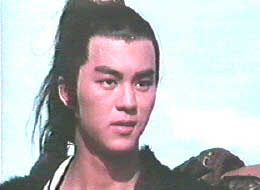 For a period, Ti Lung starred (along with Chiang
of course) in a handful of more mundane martial art yarns such as THE WATER
MARGIN (72), until BLOOD BROTHERS (1972) which showed him come of age as
an actor playing a single-minded, ruthless yet lovelorn general. He appears
to have lost a bit of the intense magnetic charisma of the earlier days
but in turn gained a more mature, and dignified presence, giving him a
greater inner majesty. The following year saw him playing a kung fu fighting
sidekick sort of role for the Anglo/H-K co-production, SHATTER. It gave
him the opportunity to speak English and a tentative shot at international
stardom that went no where because of the utter dullness of the film. Shortly
afterwards economic difficulties and the disarray of the martial art genre
following Bruce Lee's unexpected passing forced Shaw to reduce it’s operation
and to release many of it’s main stars. Unlike Chiang who after becoming
a freelancer would only work intermittently with Shaw again, Ti Lung stuck
almost totally with the studio becoming their great martial art leading
man.
For a period, Ti Lung starred (along with Chiang
of course) in a handful of more mundane martial art yarns such as THE WATER
MARGIN (72), until BLOOD BROTHERS (1972) which showed him come of age as
an actor playing a single-minded, ruthless yet lovelorn general. He appears
to have lost a bit of the intense magnetic charisma of the earlier days
but in turn gained a more mature, and dignified presence, giving him a
greater inner majesty. The following year saw him playing a kung fu fighting
sidekick sort of role for the Anglo/H-K co-production, SHATTER. It gave
him the opportunity to speak English and a tentative shot at international
stardom that went no where because of the utter dullness of the film. Shortly
afterwards economic difficulties and the disarray of the martial art genre
following Bruce Lee's unexpected passing forced Shaw to reduce it’s operation
and to release many of it’s main stars. Unlike Chiang who after becoming
a freelancer would only work intermittently with Shaw again, Ti Lung stuck
almost totally with the studio becoming their great martial art leading
man.
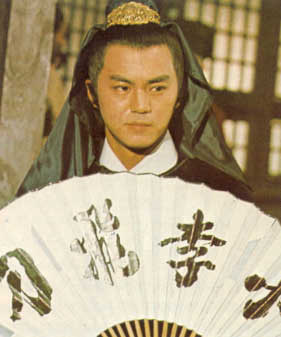
His continuous association with Shaw allowed
him to work with filmmakers other than Chang Cheh, to whom he had worked
almost exclusively with until then. With this came a greater variety of
roles such as the young Quin Emperor Guangxu for director Li Hanxiang’s
period diptych THE EMPRESS DOWAGER/ THE LAST TEMPEST (1974) a rare non
martial part, as the lead in the horror thriller BLACK MAGIC (1975).
He remained faithful to Chang however. Chang made a deal with Shaw
to make movies in quasi-autonomous fashion back in Taiwan with the money
the studio earned there and Ti Lung journeyed to the island on many occasions
to star in his mentors films - usually as part of a stellar ensemble cast
such as in FIVE SHAOLIN MASTER (AKA: FIVE MASTERS OF DEATH) (75),
ALL MEN ARE BROTHERS, SHAOLIN TEMPLE (1976), SEVEN MAN ARMY and NAVAL
COMMANDOS (both same). Tempted briefly by directing himself it was
Chang Cheh who produced his YOUNG LOVERS OF THE FLYING WHEELS (74), and
YOUNG REBELS (75) where he paired again with his old partner David Chiang.
Earlier Ti Lung had co-starred in Chiang’s own debut THE DRUG ADDICT (74)
and he had also made a special cameo appearance in SPIRITUAL BOXER (75)
the ground breaking debut of Chang Cheh’s own fight choreographer Lau Kar-leung.
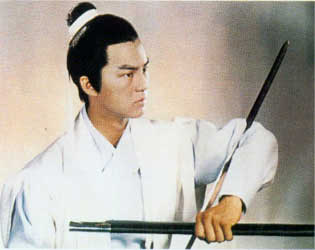
Ti Lung did a couple more films for Chang Cheh
upon the latter’s return to Hong Kong and the Shaw Studio in late 1977
like TEN TIGERS OF KWANTUNG (78), and the BRAVE ARCHER series (78- 83),
but the great days with the director were behind him. Instead, Ti Lung
found himself working for other Shaw Brothers noteworthy martial art directors
such as Sun Chong with whom he did three films: AVENGING EAGLE (78) where
as a tormented assassin rebelling against his master he won an Asian acting
award, KUNG FU INSTRUCTOR (79) and the DEADLY BREAKING SWORD (1979). By
far however, his most prolific and successful association was with director
Chor Yuen, doing nearly a dozen martial films in the span of eight years.
Starting with the MAGIC BLADE in 1976, Lung’s dark, intense and tormented
outlook peculiarly suit him for the director’s brand of Byzantine near
metaphysical swordplays that were screen adaptations of famed wuxia novelist
Gu Long. Others movies include: THE SENTIMENTAL SWORDSMAN (77), THE
JADE TIGER, CLANS OF INTRIGUE, LEGEND OF THE BAT (78), RETURN OF THE SENTIMENTAL
SWORDMAN (81) and PERILS OF THE SENTIMENTAL SWORDSMAN (82). Ti Lung’s
other substantial association with a Shaw Brothers director was with Tang
Chia, who was Lau Kar-leung's associate in choreographing Chang Cheh movies
as well as the choreographer for the Chor Yuen swordplays. His directorial
debut was SHAOLIN PRINCE (83), which saw the pairing of Ti Lung with none
other than David Chiang’s own younger brother Derek Yee. This film gave
him the opportunity for once to leave behind his usual stoic screen presence
and to play the wily hero and thus upstage his screen partner. SHAOLIN
RESCUERS came soon afterwards, then finally OPIUM AND THE KUNG- FU MASTER
one of Ti Lung's best regarded film where he plays a drug addicted martial
art master.
 As time went on the kung fu genre’s popularity
slowly declined and the films made by Shaw looked increasingly stale and
dated in comparison with other action oriented movies being made by performers
such as Jackie Chan and Sammo Hung. By the early eighties the Shaw Brothers
productions pretty much plummeted regardless of the actual quality of the
films and by 1984 the studio gave up by closing it’s movie making facilities.
This left Ti Lung and the other Shaw players in a difficult situation,
utterly typecast in a now spent unpopular genre. Thus for a while Lung’s
acting prospects seriously diminished and he began retreating into heavy
drinking as a result.
As time went on the kung fu genre’s popularity
slowly declined and the films made by Shaw looked increasingly stale and
dated in comparison with other action oriented movies being made by performers
such as Jackie Chan and Sammo Hung. By the early eighties the Shaw Brothers
productions pretty much plummeted regardless of the actual quality of the
films and by 1984 the studio gave up by closing it’s movie making facilities.
This left Ti Lung and the other Shaw players in a difficult situation,
utterly typecast in a now spent unpopular genre. Thus for a while Lung’s
acting prospects seriously diminished and he began retreating into heavy
drinking as a result.
 Ti Lung’s great opportunity came when he was cast
as the lead in a novel sort of film being directed by one of Chang Cheh's
former assistant directors, a fellow by the name of John Woo. The film
A BETTER TOMORROW imbued with the spirit of tragic heroism, honour and
male bonding once promoted by Chang but set in modern times and with guns
instead of swords or hatchets. By this time, Ti Lung of course could no
longer play the young dark impetuous warrior but the weary veteran could
still project the torment and long suffering as in the old days. The film
was of course a tremendous success, which would change Hong-Kong cinema
forever and gave a new lease of life to Ti Lung’s career. He could be seen
next in such fare as the BETTER TOMORROW sequel (87), PEOPLE HEROES, CITY
WARS, RUN DON’T WALK (89), and KILLER BLUES (90). In 1989, he played in
JUST HEROES a benefit film with a dozen of Chang Cheh’s old confederates
to finance the old masters retirement.
Ti Lung’s great opportunity came when he was cast
as the lead in a novel sort of film being directed by one of Chang Cheh's
former assistant directors, a fellow by the name of John Woo. The film
A BETTER TOMORROW imbued with the spirit of tragic heroism, honour and
male bonding once promoted by Chang but set in modern times and with guns
instead of swords or hatchets. By this time, Ti Lung of course could no
longer play the young dark impetuous warrior but the weary veteran could
still project the torment and long suffering as in the old days. The film
was of course a tremendous success, which would change Hong-Kong cinema
forever and gave a new lease of life to Ti Lung’s career. He could be seen
next in such fare as the BETTER TOMORROW sequel (87), PEOPLE HEROES, CITY
WARS, RUN DON’T WALK (89), and KILLER BLUES (90). In 1989, he played in
JUST HEROES a benefit film with a dozen of Chang Cheh’s old confederates
to finance the old masters retirement.
 With the return of the period martial art epic
in the early nineties, Ti Lung made a tentative comeback to the genre that
had made his fortune. Thus he returned in a Gu Lung screen adaptation called
A WARRIOR TRAGEDY (93) as well as a Chang Cheh inspired film such as THE
BARE-FOOT KID (93) and BLADE OF FURY (93), an unaccredited quasi-remake
of Ti Lung’s early classic BLOOD BROTHERS. For the most part it showed
him in good form but hardly any of those films were either a critical or
box-office success. Unquestionably his best turn was as Jackie Chan’s stern,
righteous martial art father in DRUNKEN MASTER II, which saw him rekindle
one last time with director Lau Kar Leung.
With the return of the period martial art epic
in the early nineties, Ti Lung made a tentative comeback to the genre that
had made his fortune. Thus he returned in a Gu Lung screen adaptation called
A WARRIOR TRAGEDY (93) as well as a Chang Cheh inspired film such as THE
BARE-FOOT KID (93) and BLADE OF FURY (93), an unaccredited quasi-remake
of Ti Lung’s early classic BLOOD BROTHERS. For the most part it showed
him in good form but hardly any of those films were either a critical or
box-office success. Unquestionably his best turn was as Jackie Chan’s stern,
righteous martial art father in DRUNKEN MASTER II, which saw him rekindle
one last time with director Lau Kar Leung.
 With the end of both the Heroic Bloodshed and
martial art epic cycle and the general decline of Hong Kong cinema Ti Lung
temporarily retired from the movies in the mid-nineties. In recent years
though he has again graced the silver screen with his now elegant mature
presence usually as a character actor in such film as THE KID (99), HIGH
Q (2000), PARAMOUNT MOTEL and CLEAN MY NAME MISTER CORONER (as the movie’s
villain). Ti Lung is still a very much active and a respected player of
Hong Kong cinema to this day. His son Shaun Tam has followed in his father’s
footsteps and started an acting as well as a singing career of his own.
As of this writing father and son are scheduled to star together in an
action thriller. Like many of his Shaw Brothers cohorts Ti Lung has probably
done some substantial TV work but nothing is known of his work in this
field by this writer.
With the end of both the Heroic Bloodshed and
martial art epic cycle and the general decline of Hong Kong cinema Ti Lung
temporarily retired from the movies in the mid-nineties. In recent years
though he has again graced the silver screen with his now elegant mature
presence usually as a character actor in such film as THE KID (99), HIGH
Q (2000), PARAMOUNT MOTEL and CLEAN MY NAME MISTER CORONER (as the movie’s
villain). Ti Lung is still a very much active and a respected player of
Hong Kong cinema to this day. His son Shaun Tam has followed in his father’s
footsteps and started an acting as well as a singing career of his own.
As of this writing father and son are scheduled to star together in an
action thriller. Like many of his Shaw Brothers cohorts Ti Lung has probably
done some substantial TV work but nothing is known of his work in this
field by this writer.
Written by Yves Gendron
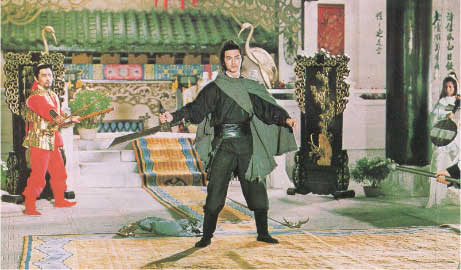
David Chiang/John Keung
Most of today’s Hong Kong viewers would know
of David Chiang for having played Luke, the ill fated would be revolutionary
of ONCE UPON A TIME IN CHINA II starring Jet Li. Few would guess that twenty
years before OUATIC, it was Chiang who was one of the top martial stars
of his time, cutting down and fighting dozens of enemies at a time, jumping
about like a graceful gazelle, a dashing cool dude with a wily smile on
his face. Paired with the majestic Ti Lung they were the great "Deadly
Duo" of Hong Kong martial cinema, the stars of a dozen "Blood Brothers"
movies that were the most violent and intense martial potboilers of the
early seventies and they ruled the Hong Kong action movie screens. Yet
as the Blood Brothers period came to an end and time passed on, his partner
Ti Lung went on to have a successful movie career maintaining his flawless
reputation, but Chiang’s career began to decline and even worse he, along
with (Jimmy) Wang Yu, became one of the most under appreciated kung fu
performers of all. Later fans of the genre found his physical skills unsatisfactory,
complained about the tacky seventies fashions which he often wore and were
a bit annoyed by his screen persona. The fact remains though that Chiang
was not only a major player in his time but an able screen-action performer
as well as an award winning actor with an original screen persona who often
outshone Ti Lung. He was the real heart and centre of some of Chang's Blood
brothers movies.
 David Chiang was born Yim Wai in 1947, the second
son of two famed actors Yim Dut and Hong Wei. Later on his widowed mother
having remarried with a movie producer she gave birth to another son. All
three siblings were destined to a have a great movie career: the
first Paul Chun as a renown character actor and the youngest Derek Yee
as an actor/director. Young Wai received a college education in Hong Kong
but had already started appearing in movies as a child actor, most notably
THE CALLS OF THE NIGHTBIRDS, LITTLE ANGEL OF THE STREET and YOUNG VAGABOND
the two latter also featuring his elder brother Paul Chun (then known
asYim Cheong) and produced by his step-father. He also appears to have
received some Peking Opera training - not enough to make him a top performer
the likes of Jackie Chan or Sammo Hung but more than enough to gave him
an unusual agility and solid physical skills. Following graduation,
he started working as a stuntman in the movies.
David Chiang was born Yim Wai in 1947, the second
son of two famed actors Yim Dut and Hong Wei. Later on his widowed mother
having remarried with a movie producer she gave birth to another son. All
three siblings were destined to a have a great movie career: the
first Paul Chun as a renown character actor and the youngest Derek Yee
as an actor/director. Young Wai received a college education in Hong Kong
but had already started appearing in movies as a child actor, most notably
THE CALLS OF THE NIGHTBIRDS, LITTLE ANGEL OF THE STREET and YOUNG VAGABOND
the two latter also featuring his elder brother Paul Chun (then known
asYim Cheong) and produced by his step-father. He also appears to have
received some Peking Opera training - not enough to make him a top performer
the likes of Jackie Chan or Sammo Hung but more than enough to gave him
an unusual agility and solid physical skills. Following graduation,
he started working as a stuntman in the movies.
 Chiang had graduated to fight-instructor by the
time he was spotted by Shaw Brothers leading martial art director Chang
Cheh, who brought him into the studio in the winter of 1966 where he then
groomed him for a couple of years. By the time he emerge he was known as
David Chiang Dai-Wai,. The meaning of his stage name and it’s origin appear
to be rather obscure: Chiang he may have taken it for no other reason than
it was a very recognizable name (because of Taiwan president Chiang Kai
Shek) with a star quality feel to it. His original first name being Wai
, “Dai” was added to make it mean “True Greatness”, “Dai-wai” being also
the direct transliteration of the English name “David”, it may also have
been deemed a suitable stage-name for him because his small frame and scholarly
looks were evocative of the Biblical David of the David and Goliath famed.
Having an English name may also have served to give him a suitable urbane
and sophisticated air that played well with his deceptively scholarly,
effete look. Regardless Chiang Dai wei can be glimpsed in GOLDEN SWALLOW
(1968) as well as THE INVINCIBLE FIST (1969), but his first major role
was in the gangster flick DEAD END (1969). He graduated to full martial
star the following year with WANDERING SWORDSMAN and especially VENGEANCE,
the first of Chang Cheh’s "Blood Brothers" movies pairing the deadly duo
of Chiang and Ti Lung. It was also a watershed movie of Hong Kong martial
arts cinema that defined and cemented Chang Cheh’s cinematic approach for
years.
Chiang had graduated to fight-instructor by the
time he was spotted by Shaw Brothers leading martial art director Chang
Cheh, who brought him into the studio in the winter of 1966 where he then
groomed him for a couple of years. By the time he emerge he was known as
David Chiang Dai-Wai,. The meaning of his stage name and it’s origin appear
to be rather obscure: Chiang he may have taken it for no other reason than
it was a very recognizable name (because of Taiwan president Chiang Kai
Shek) with a star quality feel to it. His original first name being Wai
, “Dai” was added to make it mean “True Greatness”, “Dai-wai” being also
the direct transliteration of the English name “David”, it may also have
been deemed a suitable stage-name for him because his small frame and scholarly
looks were evocative of the Biblical David of the David and Goliath famed.
Having an English name may also have served to give him a suitable urbane
and sophisticated air that played well with his deceptively scholarly,
effete look. Regardless Chiang Dai wei can be glimpsed in GOLDEN SWALLOW
(1968) as well as THE INVINCIBLE FIST (1969), but his first major role
was in the gangster flick DEAD END (1969). He graduated to full martial
star the following year with WANDERING SWORDSMAN and especially VENGEANCE,
the first of Chang Cheh’s "Blood Brothers" movies pairing the deadly duo
of Chiang and Ti Lung. It was also a watershed movie of Hong Kong martial
arts cinema that defined and cemented Chang Cheh’s cinematic approach for
years.
For a couple of years the Blood Brothers movies
were all the rage, Hong Kong’s top ranking box office champions with such
films as HEROIC ONES, THE SINGING KILLER (both 1970), THE NEW ONE ARMED
SWORDSMAN, THE DUEL, DUEL OF IRON FIST, THE DEADLY DUO, THE ANONYMOUS HEROES
(all 1971) and THE ANGRY GUEST (1972). Ti Lung and Chiang were paired
splendidly together – a wonderful contrast to one another - Ti Lung big,
majestic, very masculine and impetuous; Chiang small, urbane, dashing,
wily yet secretive and introverted. Chiang had very much an effete, romantic
quality to him but instead of being ineffectual and passive as these types
of characters tended to be within the frame of Chinese literature, he could
go on a rampage or quietly undermine an opponent with his sneaky, mysterious
ways. This gave him an air of ambiguity, as nobody knew where he stood
for a while.
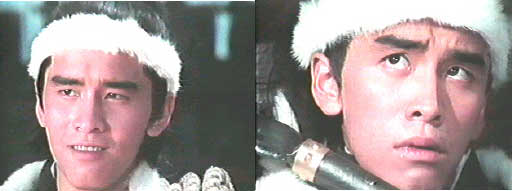 With the sudden arrival of Bruce Lee in late 1971,
the Blood Brothers movies lost some of their steam - their formula began
looking tired and Chang Cheh appeared to be losing interest
Still, Chiang remained very active by performing in a handful of Chang
martial extravaganzas such as THE WATER MARGIN (aka: SEVEN BLOWS OF THE
DRAGONS), THE FOUR RIDERS, TRILOGY OF SWORDSMANSHIP (all 1972) and the
PIRATE (1973). He was continually paired with Ti Lung but the drama and
the chemistry between them wasn't quite the same as in the old Blood Brothers
movies. He also played a small but crucial role of a dashing, charismatic
young gang boss in BOXER FROM SHANTUNG (1972) which was the starring debut
of Chang Cheh’s latest discovery, kung fu star Chen Kwan Tai. He was also
the star of a couple of Chang’s contemporary dramas such as YOUNG PEOPLE
(1972), GENERATION GAP (1972) and FRIENDS (1973).
With the sudden arrival of Bruce Lee in late 1971,
the Blood Brothers movies lost some of their steam - their formula began
looking tired and Chang Cheh appeared to be losing interest
Still, Chiang remained very active by performing in a handful of Chang
martial extravaganzas such as THE WATER MARGIN (aka: SEVEN BLOWS OF THE
DRAGONS), THE FOUR RIDERS, TRILOGY OF SWORDSMANSHIP (all 1972) and the
PIRATE (1973). He was continually paired with Ti Lung but the drama and
the chemistry between them wasn't quite the same as in the old Blood Brothers
movies. He also played a small but crucial role of a dashing, charismatic
young gang boss in BOXER FROM SHANTUNG (1972) which was the starring debut
of Chang Cheh’s latest discovery, kung fu star Chen Kwan Tai. He was also
the star of a couple of Chang’s contemporary dramas such as YOUNG PEOPLE
(1972), GENERATION GAP (1972) and FRIENDS (1973).
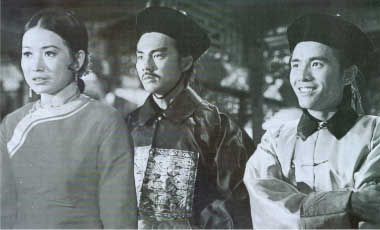 1973 also saw Chiang as part of the trio assembled
along with Ti Lung and Chen Kwan Tai in Chang Cheh’s most ambitious martial
movie drama to date: BLOOD BROTHERS aka: DYNASTY OF BLOOD. In 1974 he was
picked by Shaw Studios to play the Chinese lead in the Shaw Brother/ Hammer
hybrid horror/kung fu production LEGEND OF THE SEVEN GOLDEN VAMPIRES, which
was Chiang’s one shot at international stardom. It showed him in good fighting
form and speaking fluent if accented English, but unfortunately his role
was pretty much limited to being of the helpful and disposable amiable
ethnic man-servant variety.
1973 also saw Chiang as part of the trio assembled
along with Ti Lung and Chen Kwan Tai in Chang Cheh’s most ambitious martial
movie drama to date: BLOOD BROTHERS aka: DYNASTY OF BLOOD. In 1974 he was
picked by Shaw Studios to play the Chinese lead in the Shaw Brother/ Hammer
hybrid horror/kung fu production LEGEND OF THE SEVEN GOLDEN VAMPIRES, which
was Chiang’s one shot at international stardom. It showed him in good fighting
form and speaking fluent if accented English, but unfortunately his role
was pretty much limited to being of the helpful and disposable amiable
ethnic man-servant variety.
 That same year, a world-wide economic crisis struck
Hong Kong and that along with the disarray of the martial art’s genre following
Bruce Lee’s death, forced Shaw Brother to reduce their expenses which they
did by letting go of some of their major stars, including David Chiang
- although he would always remain closely associated with the studio on
a freelance basis. His first independent effort was trying his hand
at directing a social drama of all things - titled THE DRUG ADDICT, which
turned out to be a flop.
That same year, a world-wide economic crisis struck
Hong Kong and that along with the disarray of the martial art’s genre following
Bruce Lee’s death, forced Shaw Brother to reduce their expenses which they
did by letting go of some of their major stars, including David Chiang
- although he would always remain closely associated with the studio on
a freelance basis. His first independent effort was trying his hand
at directing a social drama of all things - titled THE DRUG ADDICT, which
turned out to be a flop.
 For the following decade Chiang would alternate
between movies for Chang Cheh/ Shaw Brothers, some freelance work and his
own productions. His Chang Cheh movies included SAVAGE FIVE (1974), FIVE
SHAOLIN MASTERS (aka FIVE MASTER OF DEATH), ALL MEN ARE BROTHERS (both
1975), SEVEN MEN ARMY, SHAOLIN TEMPLE (both 1976), NAVAL COMMANDOS and
MAGNIFICENT WANDERER (1977). Most of these films appear to have been routine
efforts from Chang when compared to his earlier works with Chiang, capitalizing
mostly on a stellar kung fu cast. In 1976, Chiang once again tried his
hand at directing with the CONDEMNED. Probably in the hope of revitalizing
his by now sagging career, Chiang then teamed up with another martial star
whose hour of glory had passed, (Jimmy) Wang Yu, and the pair
founded their own Taiwan based film company: their first film being
ONE-ARMED SWORDSMEN which Chiang also directed. Truly his own master now,
Chiang starred in his own self-production that he made at a frantic pacing.
Chiang found his best work of the period with martial director Lau Kar
Leung who had choreographed him in all the Chang Cheh movies of the early
seventies, with SHAOLIN MANTIS (1978), which not only offered him the opportunity
to deliver perhaps his best screen-fighting performance, but also to play
quite an unusual part as an unwilling Quin dynasty spy sent to infiltrate
a family of Ming dynasty rebels. In one of his other notable Shaw Brothers
films, he shaved his head so as to play the titular character in ABBOT
OF SHAOLIN (1978).
For the following decade Chiang would alternate
between movies for Chang Cheh/ Shaw Brothers, some freelance work and his
own productions. His Chang Cheh movies included SAVAGE FIVE (1974), FIVE
SHAOLIN MASTERS (aka FIVE MASTER OF DEATH), ALL MEN ARE BROTHERS (both
1975), SEVEN MEN ARMY, SHAOLIN TEMPLE (both 1976), NAVAL COMMANDOS and
MAGNIFICENT WANDERER (1977). Most of these films appear to have been routine
efforts from Chang when compared to his earlier works with Chiang, capitalizing
mostly on a stellar kung fu cast. In 1976, Chiang once again tried his
hand at directing with the CONDEMNED. Probably in the hope of revitalizing
his by now sagging career, Chiang then teamed up with another martial star
whose hour of glory had passed, (Jimmy) Wang Yu, and the pair
founded their own Taiwan based film company: their first film being
ONE-ARMED SWORDSMEN which Chiang also directed. Truly his own master now,
Chiang starred in his own self-production that he made at a frantic pacing.
Chiang found his best work of the period with martial director Lau Kar
Leung who had choreographed him in all the Chang Cheh movies of the early
seventies, with SHAOLIN MANTIS (1978), which not only offered him the opportunity
to deliver perhaps his best screen-fighting performance, but also to play
quite an unusual part as an unwilling Quin dynasty spy sent to infiltrate
a family of Ming dynasty rebels. In one of his other notable Shaw Brothers
films, he shaved his head so as to play the titular character in ABBOT
OF SHAOLIN (1978).
 Curiously enough, in a couple of the freelance
works he did for an independent company, Chiang changed his name first
to Gareth Lo before settling on John Keung (Keung being the Cantonese version
of Chiang). The truth of the matter was that “John” had been his true personal
English name all along, while David was but his stage-one that he now tried
to discard. Nevertheless he continued to be known as David Chiang by western
fans of Hong Kong. Among nearly a dozen freelance films there is YOUNG
REBEL co-starring and directed by his old partner Ti Lung, as well as DEATH
DUEL, the film debut of his younger brother Derek Yee (1977) .
Curiously enough, in a couple of the freelance
works he did for an independent company, Chiang changed his name first
to Gareth Lo before settling on John Keung (Keung being the Cantonese version
of Chiang). The truth of the matter was that “John” had been his true personal
English name all along, while David was but his stage-one that he now tried
to discard. Nevertheless he continued to be known as David Chiang by western
fans of Hong Kong. Among nearly a dozen freelance films there is YOUNG
REBEL co-starring and directed by his old partner Ti Lung, as well as DEATH
DUEL, the film debut of his younger brother Derek Yee (1977) .
 In the second half of the seventies as martial
art films evolved towards more and more comedic, Chiang moved with the
time, starring in a handful of such films. He had already done MAGNIFICENT
WANDERERS back in 1977 and now under the wing of director/ character actor
Eric Tsang he did THE LOOT (AKA BLOODY TATOO) (1980) and The CHALLENGER.
In 1981 he even directed one himself called LEGEND OF THE OWL produced
by his brother Paul Chun. As marital films then came less popular he also
gradually started doing pure comedy as well as drama and switched from
leading man to character parts. By the time the martial art era came to
a definitive close with the folding of the Shaw Brother’s movie operation,
Chiang had given up on kung fu for some time already. Beside his acting
work, he also focused much more on directing with a string of movies done
through the later eighties and early nineties consisting primarily of comedies
- SILENT LOVE (1986), MR HANDSOME (1987) DOUBLE FATTINESS (1988), MY DEAR
SON (1989), WHEN EAST MEETS WEST (1990) and WILL OF IRON (1991).
He also planned or produced a handful of films as well including JUST HEROES,
a movie that involved a dozen of Chang Cheh’s close associates in order
to help finance his planned retirement and the Jackie Chan twin’s movie
TWIN DRAGONS. After a hiatus of several years he came back one last time
to directing with MOTHER OF A DIFFERENT KIND in 1995.
In the second half of the seventies as martial
art films evolved towards more and more comedic, Chiang moved with the
time, starring in a handful of such films. He had already done MAGNIFICENT
WANDERERS back in 1977 and now under the wing of director/ character actor
Eric Tsang he did THE LOOT (AKA BLOODY TATOO) (1980) and The CHALLENGER.
In 1981 he even directed one himself called LEGEND OF THE OWL produced
by his brother Paul Chun. As marital films then came less popular he also
gradually started doing pure comedy as well as drama and switched from
leading man to character parts. By the time the martial art era came to
a definitive close with the folding of the Shaw Brother’s movie operation,
Chiang had given up on kung fu for some time already. Beside his acting
work, he also focused much more on directing with a string of movies done
through the later eighties and early nineties consisting primarily of comedies
- SILENT LOVE (1986), MR HANDSOME (1987) DOUBLE FATTINESS (1988), MY DEAR
SON (1989), WHEN EAST MEETS WEST (1990) and WILL OF IRON (1991).
He also planned or produced a handful of films as well including JUST HEROES,
a movie that involved a dozen of Chang Cheh’s close associates in order
to help finance his planned retirement and the Jackie Chan twin’s movie
TWIN DRAGONS. After a hiatus of several years he came back one last time
to directing with MOTHER OF A DIFFERENT KIND in 1995.
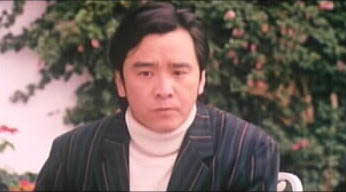 His most noticeable acting performances since
the mid-eighties include: a Cinema City ghost comedy TILL DEATH DO WE SCARE
(1982), an action comedy with Sammo WHERE’S OFFICER TUBA (86), SHANGHAI
13 (his last movie for Chang Cheh (1986)), ANGEL (1989), ONCE UPON A TIME
IN CHINA II (1992), WHAT PRIZE GLORY (1994) and LEGEND OF SPEED (1999).
He also has done some TV work. In total, Chiang has acted in more than
75 movies so far: (around 30 by Chang Cheh alone). He has also appeared
in YES MADAM, TWINKLE TWINKLE LUCKY STARS (both cameos, both 1985), IT'S
A MAD MAD WORLD, SOUL (both 1986), TIGER ON A BEAT (1989), MARY FROM BEIJING
(1992) and THE ADVENTURERS (1995). So although his glory days as a top
ranking martial art/action star were relatively short in duration, he has
had a long-lived and deserving career that continues to this day.
His most noticeable acting performances since
the mid-eighties include: a Cinema City ghost comedy TILL DEATH DO WE SCARE
(1982), an action comedy with Sammo WHERE’S OFFICER TUBA (86), SHANGHAI
13 (his last movie for Chang Cheh (1986)), ANGEL (1989), ONCE UPON A TIME
IN CHINA II (1992), WHAT PRIZE GLORY (1994) and LEGEND OF SPEED (1999).
He also has done some TV work. In total, Chiang has acted in more than
75 movies so far: (around 30 by Chang Cheh alone). He has also appeared
in YES MADAM, TWINKLE TWINKLE LUCKY STARS (both cameos, both 1985), IT'S
A MAD MAD WORLD, SOUL (both 1986), TIGER ON A BEAT (1989), MARY FROM BEIJING
(1992) and THE ADVENTURERS (1995). So although his glory days as a top
ranking martial art/action star were relatively short in duration, he has
had a long-lived and deserving career that continues to this day.
(Written up by Yves Gendron)
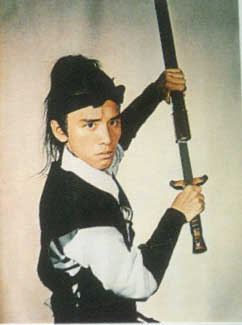
Wang Lung-wai/Johnny Wang Lung Wai/Johnny
Wong.
In Chinese “ Lung Wai” means “as Invincible
or as Mighty as the Dragon”. With his fierce, burly looks, his ruthlessly
minded characters and his superb screen fighting skills, none are much
more deserving of such a name than Shaw Brother’s studio powerhouse k-f
villain Wang Lung-wai. His attitude and spectacular bouts with the likes
of Chen Kwan Chun, Fu Sheng, Lau Kar Fei (better known as Gordon Liu or
Lau in the West) and the Venoms have made him one of classic k-f ‘s favourite
heavies
 Nothing is known by this reviewer of Wang Lung-wei’s
history before he started appearing in movies, or how he got into them.
It seems likely however that he already had an extended background of martial
arts just as Gordon Liu did. An interesting titbit though, Wang is known
to have expressed the desire to challenge Bruce Lee before the man’s death
put an end to such an aspiration, which may say something about his level
of skill and ego. Either he was spotted as a stuntman on a studio set or
more likely entered the Shaw’s Studio acting course. In any case, Wang
eventually found his way to Taiwan working on a film by Shaw top-Martial
director Chang Cheh: SHAOLIN MARTIAL ART (74) which also saw the debut
of the likes of Leung Kar-yan and the aforementioned Gordon Liu. His part
as a specially trained Manchu super-fighter called for him to remain mute
with a blank expression throughout the film. This didn’t give him much
opportunity to shine - until he got to fight that is, when he started kicking
some major ass. This was a great promising beginning.
Nothing is known by this reviewer of Wang Lung-wei’s
history before he started appearing in movies, or how he got into them.
It seems likely however that he already had an extended background of martial
arts just as Gordon Liu did. An interesting titbit though, Wang is known
to have expressed the desire to challenge Bruce Lee before the man’s death
put an end to such an aspiration, which may say something about his level
of skill and ego. Either he was spotted as a stuntman on a studio set or
more likely entered the Shaw’s Studio acting course. In any case, Wang
eventually found his way to Taiwan working on a film by Shaw top-Martial
director Chang Cheh: SHAOLIN MARTIAL ART (74) which also saw the debut
of the likes of Leung Kar-yan and the aforementioned Gordon Liu. His part
as a specially trained Manchu super-fighter called for him to remain mute
with a blank expression throughout the film. This didn’t give him much
opportunity to shine - until he got to fight that is, when he started kicking
some major ass. This was a great promising beginning.
 Wang spent the next three years working in Taiwan
exclusively for Chang Cheh, playing either Manchu fiendish henchmen or
traitorous Chinese collaborators in such films as FIVE SHAOLIN MASTERS
(74), MARCO POLO (75), NEW SHAOLIN BOXERS (76), SHAOLIN TEMPLE. Back in
Hong-Kong and the huge Shaw studio lot, Wang continued to do films with
Chang such as BRAVE ARCHER (77), THE CHINATOWN KID and cult favourite
FIVE VENOM (78) where he got an all too rare non-fighting part as
a corrupt judge. He was probably one of Shaw’s busiest performers as he
played movie villains for a good dozen of other Shaw Brother’s movies throughout
the years including such classics as AVENGING EAGLE (78), TREASURE HUNTERS
(82) and LADY ASSASSIN (83) among others.
Wang spent the next three years working in Taiwan
exclusively for Chang Cheh, playing either Manchu fiendish henchmen or
traitorous Chinese collaborators in such films as FIVE SHAOLIN MASTERS
(74), MARCO POLO (75), NEW SHAOLIN BOXERS (76), SHAOLIN TEMPLE. Back in
Hong-Kong and the huge Shaw studio lot, Wang continued to do films with
Chang such as BRAVE ARCHER (77), THE CHINATOWN KID and cult favourite
FIVE VENOM (78) where he got an all too rare non-fighting part as
a corrupt judge. He was probably one of Shaw’s busiest performers as he
played movie villains for a good dozen of other Shaw Brother’s movies throughout
the years including such classics as AVENGING EAGLE (78), TREASURE HUNTERS
(82) and LADY ASSASSIN (83) among others.
 What made him such an invaluable player was not
just his mean look and great screen fighting skills but also his ability
to “sell” his opponent as great fighter even though they were actually
not as proficient as him in real life. That’s not as easy at it sounds.
Superb bootmaster and screen villain favourite Hang Jang Lee frequently
so completely dominated his opponents in his bouts that when finally he
had to be beaten it looked lame and thus diminishing the believability
of the spectacle. Not so with Wang Lung Wei who would deliver a superb
fighting performance and then look convincingly beaten without the fight
ever losing it’s edge or credibility, an aspect of screen fighting which
involves much more than martial artistry or plain choreography but fine
physical “acting” skills as well.
What made him such an invaluable player was not
just his mean look and great screen fighting skills but also his ability
to “sell” his opponent as great fighter even though they were actually
not as proficient as him in real life. That’s not as easy at it sounds.
Superb bootmaster and screen villain favourite Hang Jang Lee frequently
so completely dominated his opponents in his bouts that when finally he
had to be beaten it looked lame and thus diminishing the believability
of the spectacle. Not so with Wang Lung Wei who would deliver a superb
fighting performance and then look convincingly beaten without the fight
ever losing it’s edge or credibility, an aspect of screen fighting which
involves much more than martial artistry or plain choreography but fine
physical “acting” skills as well.
Of all the Shaw Brothers’s directors, none
used him as well as martial art master filmmaker Lau Kar Leung, who cast
him in more elaborate parts than just the plain movie fighting bad-ass.
In DIRTY HO for example instead of his usual powerhouse k-f opponent, he
played a suave, wine tasting assassin who tries to do Gordon Liu in with
a fan and subtle k-f strokes all the while holding a courteous conversation
with his target. In MY YOUNG AUNTIE he played the greedy older uncle
who is challenged by Lau Kar Leung himself at the end. His best part
though was in MARTIAL CLUB, where he played not a villain for once but
an honourable Northern master duped by the film’s bad-guys into fighting
Gordon Liu. He engages Liu in the film’s showdown in a riveting duel down
a shrinking alley where each fighter has to change their fighting approach
to adapt for the other and the changing environment. This part is an all
time favourite for most of Wang Lung- wei fans and perhaps more reflective
of his actual personality as a k-f passionate than his usual part of a
ruthlessly minded bad-guy.
 Wang Lung Wei strayed occasionally from the Shaw
Brother movie lot. Among the half dozen non-Shaw movies he did was in TWO
TOOTHLESS TIGERS (79) that was produced by and starring Sammo Hung. He
plays a long grey haired ruthless bounty hunter who goes toe to toe against
Golden Harvest’s regular bad guys Lee Hoi- San and Chung Fat, as well as
the big-man himself at the end - all the way looking fiercer than ever
under Sammo’s customary fierce and brutal brand of choreography. In 1981
he had another all too rare good guy part in Kirk Wong’s post- apocalyptic
actioner HEALTH WARNING (81).
Wang Lung Wei strayed occasionally from the Shaw
Brother movie lot. Among the half dozen non-Shaw movies he did was in TWO
TOOTHLESS TIGERS (79) that was produced by and starring Sammo Hung. He
plays a long grey haired ruthless bounty hunter who goes toe to toe against
Golden Harvest’s regular bad guys Lee Hoi- San and Chung Fat, as well as
the big-man himself at the end - all the way looking fiercer than ever
under Sammo’s customary fierce and brutal brand of choreography. In 1981
he had another all too rare good guy part in Kirk Wong’s post- apocalyptic
actioner HEALTH WARNING (81).
After Shaw’s closure in 1984, Wang continued
to play the henchmen or bad ass for other studios or companies. In 1988
he could be glimpsed in Jackie Chan’s PROJECT A II (88), but as Jackie’s
brand of action by that time was of the stunt or one against many variety,
it meant Jackie never came to truly duel Wang, who was quite wasted in
the film as a secondary crony unworthy of his repute and talent. Just as
briefly but far more memorable was his turn in Sammo’s 1986 all star caper
MILLIONAIRE EXPRESS playing a fierce looking thug in the film’s extended
finale that has him thrashing Meng Hoi and his former Shaw Brother confederate
Hsiao Ho. Another noticeable appearance was his turn as a vengeful and
gun-toting triad boss in the first third Of Yuen Woo Ping’s TIGER CAGE
(89).
 At the same time, Wang Lung Wei tried his hand
at directing in 1985 with THIS MAN IS DANGEROUS, which he also wrote. His
genre of choice would be the urban potboilers and for the next seven years
he made seven other films. These included HONG KONG GODFATHER (86) (also
wrote again), INNOCENT INTERLOPER (87), CITY WARRIOR (88) and WIDOW WARRIORS
(89). His last effort was the exploitation ESCAPE FROM BROTHEL (93), mixing
action, melodrama and skin, sporting probably one of the tackiest sights
ever in a H-K film: female gweilo action performer Sophia Crawford fighting
bad guy Billy Chow completely in the nude. Future Buffy stunt double in
the buff, the ultimate jiggle show. Yikes!
At the same time, Wang Lung Wei tried his hand
at directing in 1985 with THIS MAN IS DANGEROUS, which he also wrote. His
genre of choice would be the urban potboilers and for the next seven years
he made seven other films. These included HONG KONG GODFATHER (86) (also
wrote again), INNOCENT INTERLOPER (87), CITY WARRIOR (88) and WIDOW WARRIORS
(89). His last effort was the exploitation ESCAPE FROM BROTHEL (93), mixing
action, melodrama and skin, sporting probably one of the tackiest sights
ever in a H-K film: female gweilo action performer Sophia Crawford fighting
bad guy Billy Chow completely in the nude. Future Buffy stunt double in
the buff, the ultimate jiggle show. Yikes!
 Wang Lung Wei has considerably slowed down his
film activity in the nineties although he still makes an occasional appearance
at least once a year. Thus once again he became a Manchu fiend for Jet
Li’s NEW LEGEND OF SHAOLIN (95). Arguably, however his most memorable turn
was as the gold chain wearing triad boss of YOUNG AND DANGEROUS (96) scaring
the hell out of Jordan Chan’s character who is going out with his daughter.
Wang Lung Wei has considerably slowed down his
film activity in the nineties although he still makes an occasional appearance
at least once a year. Thus once again he became a Manchu fiend for Jet
Li’s NEW LEGEND OF SHAOLIN (95). Arguably, however his most memorable turn
was as the gold chain wearing triad boss of YOUNG AND DANGEROUS (96) scaring
the hell out of Jordan Chan’s character who is going out with his daughter.
 Wang’s last reported acting gig in film was in
the reportedly crappy MILLENIUM DRAGON (99) starring Yuen Biao. He is also
credited as executive producer of the reportedly dreadful THE BARONESS
(2000). Like Gordon Liu, Wang still remains an active player on TV, and
both men can be seen in the recent FIST OF HERO starring Chiu Man Chuck
and Wang still looks quite sharp.
Wang’s last reported acting gig in film was in
the reportedly crappy MILLENIUM DRAGON (99) starring Yuen Biao. He is also
credited as executive producer of the reportedly dreadful THE BARONESS
(2000). Like Gordon Liu, Wang still remains an active player on TV, and
both men can be seen in the recent FIST OF HERO starring Chiu Man Chuck
and Wang still looks quite sharp.
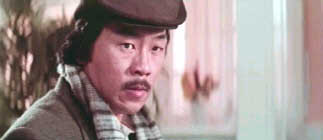 Besides the aforementioned TWO TOOTHLESS TIGERS,
MY YOUNG AUNTIE and MARTIAL CLUB, Wang’s best fighting displays can be
found in NEW SHAOLIN BOXERS, INVINCIBLE SHAOLIN (Wang’s best showcase in
a Venom movie) and YOUNG VAGABOND (81).
Besides the aforementioned TWO TOOTHLESS TIGERS,
MY YOUNG AUNTIE and MARTIAL CLUB, Wang’s best fighting displays can be
found in NEW SHAOLIN BOXERS, INVINCIBLE SHAOLIN (Wang’s best showcase in
a Venom movie) and YOUNG VAGABOND (81).
(Written up by Yves Gendron)



























